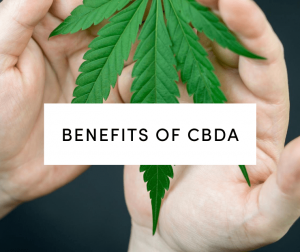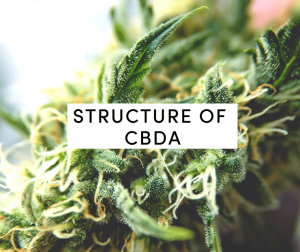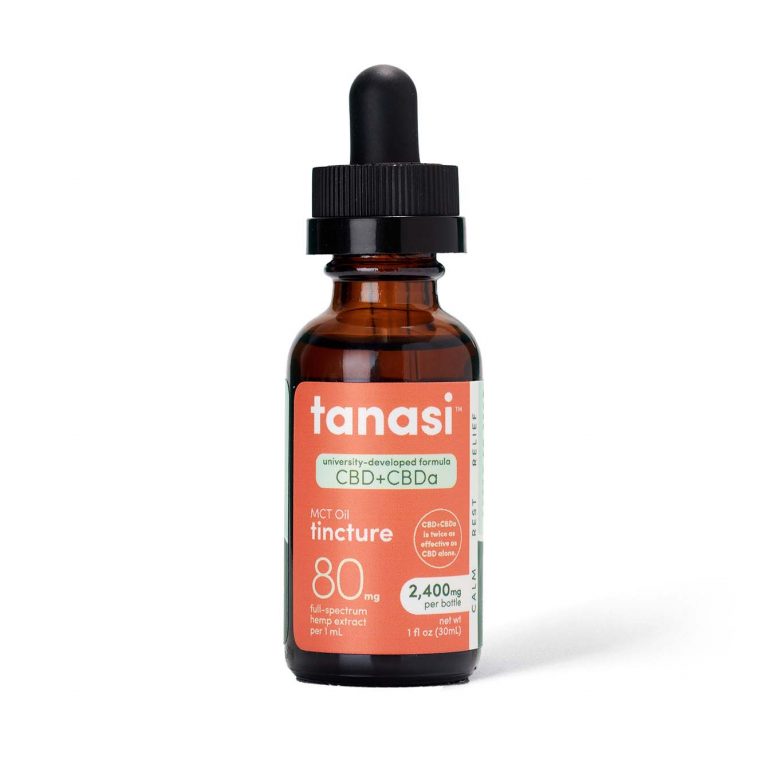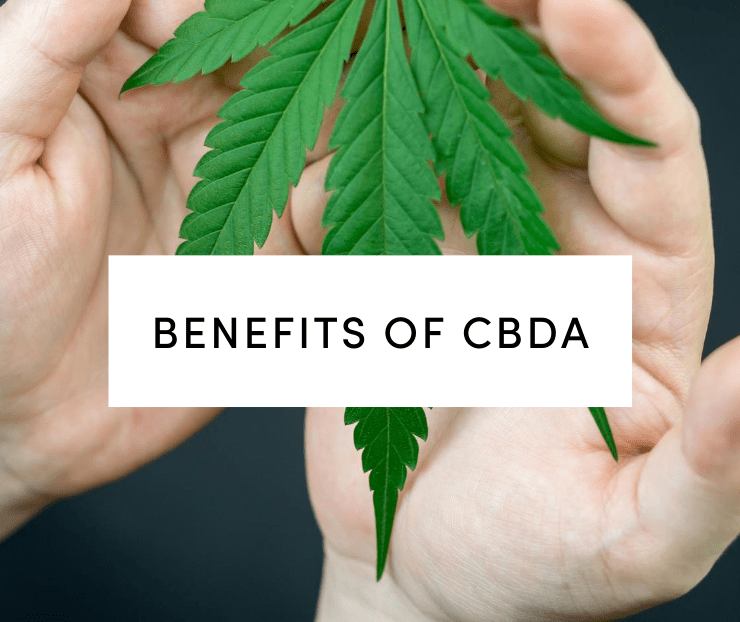What Are The Benefits Of CBDA?
Posted on July 26th, 2022
The pharmacological activity of CBDa has been studied for more than a decade. It has been found that it has anti-inflammatory properties that could make it a naturally viable and safe alternative to NSAIDs. Its ability to inhibit inflammatory enzymes makes it a safe option for the treatment of various chronic medical conditions.
When considering CBD products, you’ll find that CBD (cannabidiol) is one of many cannabinoids present in the cannabis plant. What you may not know is that the cannabis plant does not directly synthesize cannabidiol. CBD is actually a byproduct of ‘cannabidiolic acid’ or CBDa. Therefore CBD begins as CBDa. Knowing the difference and understanding which one is better can help you make an informed purchasing decision.
What is the Difference Between CBD and CBDa? 
CBD and CBDa are just two of more than 100 cannabinoids in the Cannabis sativa plant. They share many similarities but also significant differences. Both are non-intoxicating and can help support your body and mind.
While CBD is the most common hemp component, known for its diverse health benefits, it’s not actually what hemp plants produce. Instead, the plant produces cannabidiolic acid, CBD’s raw, unheated precursor. CBDa slowly converts to cannabidiol at room temperature, or more rapidly at higher temperatures. Then we can extract CBD from the hemp leaves and flowers.
Key Differences
Some of the most important differences between CBD and CBDa are:
– When taken by mouth CBDa is more easily absorbed compared to CBD (up to 11 times)
– Both have anti-inflammatory properties, however, they may act via different mechnisms in the body. Unlike CBD, for example, CBDa has been shown to inhibit the activity of COX-2, the enzyme responsible for increased inflammation.
Based on studies with rodents CBDa may be more potent for some applications such as stress-induced anxiety, seizures, pain, and inflammation. Although it is not known whether similar results translate to humans, CBDa may be more potent at lower doses than CBD.
While producing CBD is of great importance, there are many other benefits to using CBDa oils. While most phytocannabinoids stimulate or bind to CB1 and CB2 receptors that influence communication through a cellular network in the body known as the endocannabinoid system, CBDa does not exhibit undue interest in either one of these two receptors. However, it still seems to have a positive influence on the endocannabinoid system by balancing the COX-2 (cycloxygenase-2) enzyme, thereby providing its own unique health benefits.
These benefits tend to round out the overall efficacy of other phytocannabinoids in a synergistic, entourage effect. Because each phytocannabinoid has its own special skills to present a positive impact on the endocannabinoid system, broad or full-spectrum CBD products are recommended instead of CBDa isolates. While a CBDa distillate may be beneficial, broad and full spectrum CBD products have been optimized to promote a full entourage effect. This means that other phytocannabinoids present in a CBD formula will enhance the overall experience of the user.
What are the Benefits of CBDa
CBDa has a wide range of possible health applications. Many come from its pain-relieving and anti-inflmmatory properties.
Anxiety and Depression
While anxiety is often characterized by overhwelming feelings of nervousness, fear, and worry, depression results in persistent feelings of unexplained sadness. Through research, CBDa has demonstrated a potential thertapeutic action for those whose quality of life is affected by these disorders. Even more so than CBD, CBDa has an attraction to the serotonin receptors in our bodies that help to alleviate conditions such as anxiety and depession. In a 2018 study, CBDa was found to reduce stress-induced anxiety behavior in rats. In another 2020 study, CBDa was found to normalize induced anxiety in related behavior of rats. Until more studies can be conducted to determine its efficacy, CBDa remains a latent treatment for different medical conditions.
Reduces Inflammation
CBDa has been found to reduce inflammation in many different chronic conditions such as arthritis and Chron’s disease. In one study it has been found that CBDa is more effective at reducing inflammation than CBD. A study with rats found that CBDa was effective at reducing inflammation and treating a range of conditions related to inflammation. Even though the ability of CBDa to reduce inflammation promises great benefits to many people, more research is needed to confirm this.
Analgesic Effects
CBDa has been found to be effective at reducing symptoms of nausea and vomiting caused by conditions such as motion sickness or morning sickness in pregnancy. It has also been shown to be helpful in the treatment of nausea induced by chemotherapy and reduce the frequency and severity of vomiting after chemotherapy treatments.
Anti-Cancer Effects
One study suggests that CBDa can inhibit breast cancer cell growth. Another study found that CBDa killed colon cancer cells. Although we need more research, studies suggest that CBDa may one day become a cancer treatment in certain instances.
Anti-Depressant Effects
Although still at the precilinical stage, preliminary research has shown that CBDa has more significant anti-depressant effects than CBD. This could be because CBDa has a greater affinity with the body’s serotonin receptors.
Anti-Convulsive Effects
5-HT serontonin recpetors in the body are responsible for seizure control. Because CBDa has greater affinity for these receptors, it uses this mechanism to provide anti-convulsive benefits.
CBDa as a Precursor to CBD 
Decarboxylated CBDa seems to offer the same therapeutic benefits as CBD.
The Bioavailability of CBD
Recent studies highlighted how CBDa increases CBD’s bioavailability and health-promoting benefits. A 2016 study conducted by Dr. Gerhard Nahler at the International Institute of Cannabinoids demonstrated that CBDa’s interactions with CBD more than doubles CBD’s bioavailability.
Anti-microbial and Tumor-Inhibiting Effects
In a similar study, CBDa showed anti-microbial, anti-inflammatory, and tumor-inhibiting properties. It also helped suppress nausea and vomiting.
Joint and Muscle Effects
Even though many things cause joint and muscle discomfort, one major trigger is having too much Cox-2 enzyme in your body. That’s because Cox-2 makes your body produce prostaglandins. And people with joint stiffness display elevated levels of these hormones. Since CBDa helps balance the Cox-2 enzymes, it may help you enjoy a more active lifestyle.
So Is CBDa Better Than CBD?
While these compounds are similar, they offer unique therapeutic benefits based on the way they interact with different body systems. CBDa has 2 distinct advantages over CBD:
– CBDa has greater bioavailability than CBD meaning that a little can go a long way
– Because CBDa is not combusted, it may be safer than CBD.
Although the health benefits presented in this article prove to be promising, experts caution that we need larger clinical trials to validate preliminary findings.
What are the Benefits of CBDa: Side Effects and Safety
Most manufacturers use the flowers and raw leaves of the hemp and cannabis plants to extract the benefits of CBDa. It is therefore generally safe to use with no significant side effects. However, it is always recommended to consult your physician before taking any supplement or medication, including CBDa.






